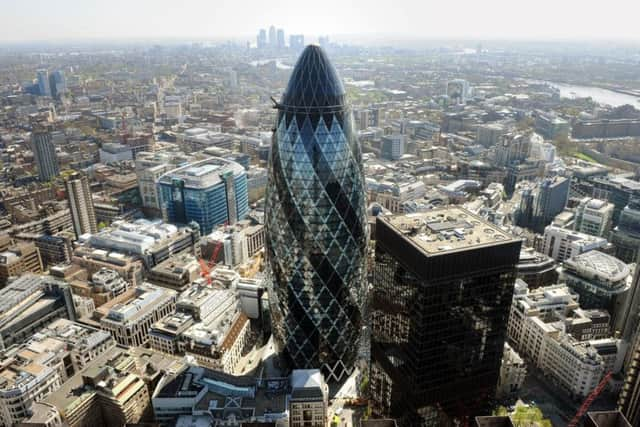Yorkshire share decline ‘worse than Financial Crisis’


The average decline in share price between January and June of this year for the region’s firms was 26.5 per cent, compared to 20. per cent across the UK and higher than the 20 per cent seen during the 2008 crisis.


The figures, released by professional services firm EY, also revealed that Yorkshire and North East quoted companies issued nine profit warnings between April and June this year.
Advertisement
Hide AdAdvertisement
Hide AdThis is down slightly on the ten profit warnings issued in the first quarter, taking the total issued during the first half of 2019 to 19.
The same number of warnings were issued by Yorkshire and North East businesses in the first half of last year.


Totals
A total of 69 profit warnings were issued across the UK in the second quarter - up 19 per cent year-on-year - representing the highest second quarter total since 2008.
Advertisement
Hide AdAdvertisement
Hide AdAlmost one in five listed companies blamed Brexit as a contributory factor.
Hunter Kelly, EY’s head of restructuring for Yorkshire and the North East, said: “There is now clear evidence that prolonged Brexit uncertainty has created a hiatus in business activity, with companies scaling back on expenditure and investment, which is making it difficult to forecast and plan with any certainty. The economic impact of this is spreading across a broad range of sectors.
“However, Brexit is not the only factor at play and the slowing global growth and fluctuations in trade and geopolitical tensions between the US and China are adding further unpredictably for the second half of 2019.
“Profit warnings issued by Yorkshire and North East companies were spread evenly across a range of different sectors - from chemicals to leisure to financial services - and this partly reflects the spread of industries and sectors we have in the region, as well the fact that the challenges faced span multiple sectors.”
Sectors impacted
Advertisement
Hide AdAdvertisement
Hide AdThe FTSE sectors issuing the most warnings in Q2 across the UK were retailers, chemicals, construction, financial services and support services.
In the last year, 14 FTSE sectors recorded Brexit-related profit warnings, five of which were added in the second quarter of 2019.
Whilst the UK economy grew by a better than expected 0.5 per cent in the first quarter of the year, EY said it was likely to have suffered a mild contraction in the second quarter, with lumpy retail sales suggesting that UK households still have the urge to spend, but do not have the confidence or means to buy at will.
Mr Kelly added: “Consumer spending has been surprisingly resilient until now, but sales of discretionary and high-value purchases - such as cars - are coming under particular pressure as confidence slips.
Advertisement
Hide AdAdvertisement
Hide Ad“There are signs that the spring sunshine brought consumer spending forward, but weather-related retail sales have lost momentum in Q2.
“Most consumer businesses will now be focused on the all-important final ‘golden quarter’. Profit warnings from retailers usually drop over the summer, but this is unlikely to be a normal third quarter, and the usual patterns of warning could be turned upside down.”
Uncertainity
EY said that the profit warning data, taken alongside the latest industry surveys, suggested the UK is experiencing a sea-change in the economy as it labours under increasing uncertainties.
The EY ITEM Club has maintained its 2019 UK GDP growth projections of 1.3 per cent for 2019 and 1.5 per cent for 2020, if the UK leaves the EU with a deal in place on or before October 31.
Advertisement
Hide AdAdvertisement
Hide AdHowever it predicts a mild recession under a ‘no-deal’ scenario - a 40 per cent probability in their estimation.
Markets
Markets ended lst week on a cautious note, despite assurances from the Bank of England regarding the economic impact of a no deal Brexit.
The central bank had said on Thursday that the UK’s banks were able to withstand a no-deal exit, pointing to decent levels of liquidity in the sector.
The FTSE 100 closed down 3.85 points at 7,505.97, a move of just 0.1 per cent while Europe had a similar experience, with the Cac 40 in France down 0.4 per cent and the German Dax 30 off by 0.1 per cent.
Advertisement
Hide AdAdvertisement
Hide AdBank of England Monetary Policy Committee Member, Gertjan Vlieghe, warned last week that it might need to cut interest rates almost to zero after a no-deal Brexit, while repeated Brexit delays could also make a rate cut necessary.